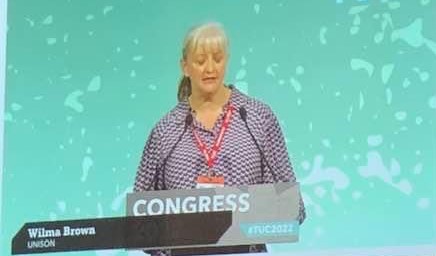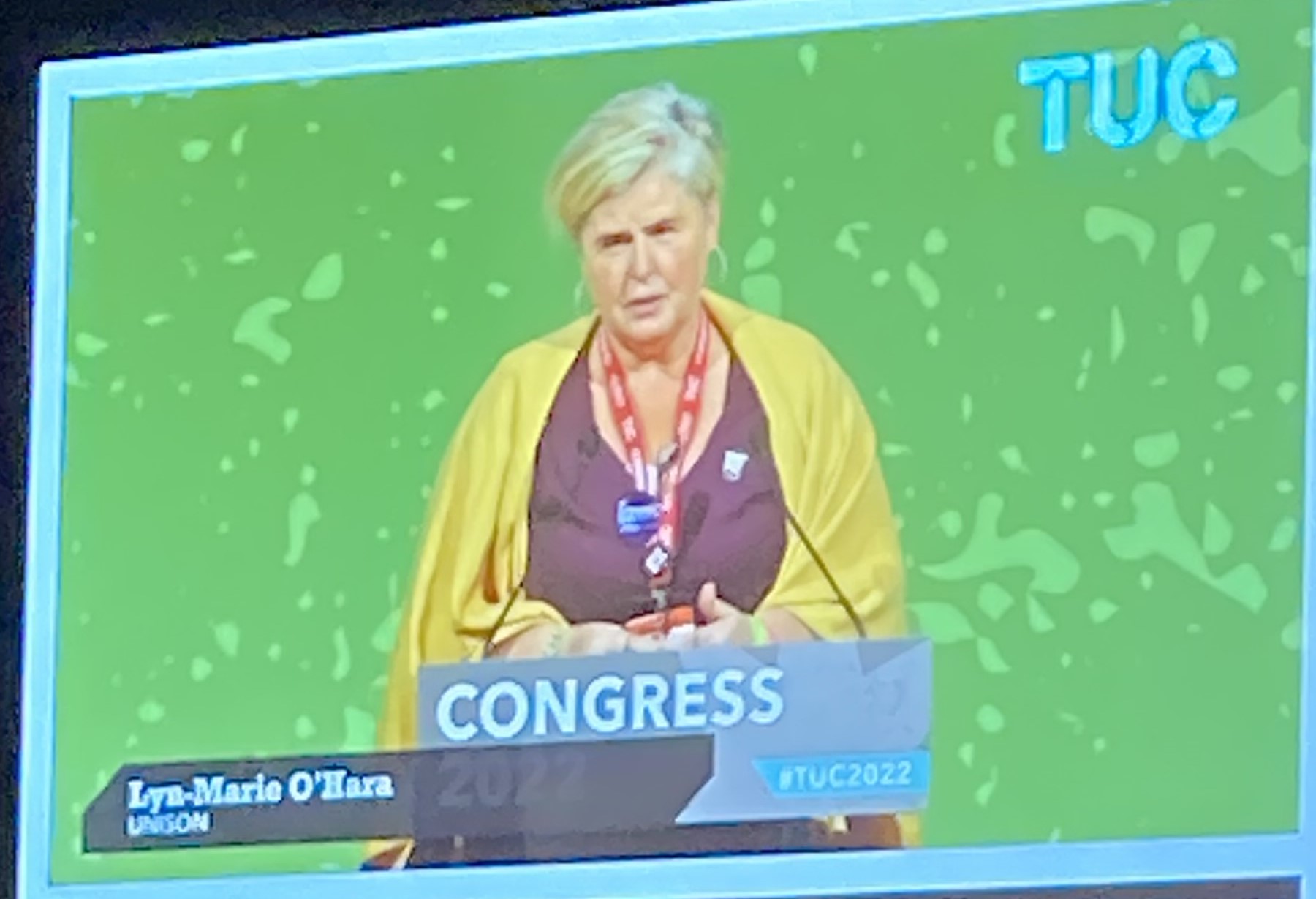


Congress demands better for workers and the economy
TUC Congress 2022 in Brighton demanded better for all workers across the UK, for the benefit not just of individuals but for the economy as a whole.
Solidarity was a key theme. Most trade unions were in dispute on the back of the cost of living crisis, exacerbated by below inflation wage rises, leaving many workers facing impossible choices between eating and heating. The spectre of people dying of cold or starvation in the sixth richest country in the world and workers dependent on benefits and foodbanks, was the backdrop to passionate and often angry speeches.
As more and more union members find the confidence to take collective action, and their voice, Congress called for co-ordination against attacks on our members’ livelihoods and lives.
Scotland was represented at TUC Congress by convener, Lilian Macer. Also in attendance were Wilma Brown, representing the Health Service Group, and NEC members, Lyn-Marie O’Hara, Davena Rankin and Kate Ramsden.
Tackle NHS staffing crisis with decent pay
Congress condemned the recruitment and retention crisis in health care, and demanded urgent action to tackle this. It called for an urgent retention package for NHS staff, with a restorative pay rise for all workers at its heart and a co-ordinated campaign by all affiliated NHS unions and the TUC to protect members from further erosions of their terms and conditions such as pay, pensions and flexible working.
Seconding the Chartered Society of Physiotherapy motion, UNISON Scotland’s Wilma Brown highlighted the enormity of the problems the NHS is having in recruiting and retaining the staff it needs, with more than 130,000 vacancies – which means around 1 in 10 posts is not being filled.
“It is little surprise that staff are suffering from exhaustion and burnout, with some suffering from PTSD. A major issue across the service in all areas,” slammed Wilma.
She told delegates that the government should have been tackling these shortages through better workforce planning and fully funded, long-term workforce strategies.
But front and centre, is a proper pay rise, she added, reminding delegates that UNISON, and sister health unions, are currently engaged in challenging the pay awards made to healthcare staff across the different parts of the UK.
“None of these awards come close to recognising the years of austerity, hard work and sacrifice that health staff put in day after day, nor the fact that recent pay awards have failed to keep pace with inflation, not to mention, the extra toll on staff that the pandemic has exerted.
“In the longer term, securing decent pay awards is by far the most important way we can address the recruitment crisis in the NHS,” said Wilma.
Standing together to deliver equal pay
Congress slammed the historic and structural undervaluing of women’s work and called for bold action in campaigning for equal pay. It recognised that this persists in roles women predominantly hold because women are themselves undervalued.
Lyn-Marie O’Hara supported the motion, speaking from her own experience of Glasgow’s successful action on equal pay, told delegates that the women involved in the action were all in low paid jobs like cleaners, carers, caterer – “invisible in the jobs they do, but when we stood together and took action, we were incredibly visible.”
That action put half a billion pounds in the pockets of those essential workers. “That’s what it’s all about,” said Lyn-Marie, “Putting money in the pockets of our members.
“Strike action is the power you have when you’re a member of a trade union. No one wanted to strike but that’s what made the difference.”
When Glasgow City Council tried to dump the deal, by giving some workers more than others, the trade unions came together again to ballot for action. “We are now awaiting another pay-out,” said Lyn-Marie to huge applause.
Unions must lead on tackling sexual harassment
Congress backed a range of measures to end sexual harassment in the workplace, including trade unions, with steps to make it easier to report.
Moving a motion from TUC Women’s Conference, UNISON Scotland’s Davena Rankin told delegates that violence against women and girls can take many forms and is a deep-seated problem within our culture.
“Sexual harassment can happen to anyone,” said Davena, “However, the majority of those affected are women. And the aggressors are overwhelmingly men, regardless of the gender of their victims.”
She condemned the lack of action from the UK Government, despite promises, and compared that to the proactive approach taken in Scotland, where Davena represents the STUC on the Equally Safe in Colleges and Universities Core Leadership Group, aiming to reduce sexual harassment on campuses.
“There is a tidal wave of sexual harassment in workplaces across the UK, and we need to be honest and recognise that our own trade unions are not immune,” warned Davena, highlighting the TUC Women’s Committee report on tackling and preventing sexual harassment which provides an update from the TUC executive committee working group on tackling and preventing sexual harassment in the movement.
She called on all activists to read and act on the report. “Women make up nearly sixty per cent of our membership, they and all trade union staff must be safe and equal in our spaces, this is our legal and moral duty,” she urged.
“We need leadership and action – and we need them now.”
